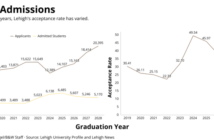
Jake Epstein
I am horrified. I am shocked. And I am furious.
On Saturday, my Twitter feed blew up with reports of a poison gas attack in the suburbs of Damascus, the Syrian capital.
This occurred nearly a year after a similar gas attack in northern Syria, and almost five years after another attack in 2013.
Brutally graphic images circulated on my feed, while politicians and state officials condemned the attacks, offering their thoughts and prayers, as they always do.
Yet Bashar al-Assad remains in power, slaughtering his own people.
I praise the efforts of journalists, citizens and anyone else who capture the raw emotion and utter chaos of the Syrian Civil War, as I’ve been following it closely over the years in the news and on social media.
My close friends know that my aspirations as a journalist are to do the same.
This line of journalism is often discouraged, especially by my parents, though I simply want to contribute to the exposure of the heinous atrocities the Assad regime has committed against its own people.
The regime carries no respect for human life. Schools, hospitals, markets, street corners or dinner tables. If you are at one of these, at any given point in the day, your very existence is in critical danger.
A year ago, infuriated, I wrote an email to the United Nations Office on Genocide Prevention. I knew it probably wasn’t even going to be opened, but I didn’t care.
In theory, the U.N. Human Rights Council is designed to address and prevent violations of human rights, genocide, ethnic cleansing, war crimes and crimes against humanity.
So why do we still see this happening?
“Paragraph 139 of the 2005 World Summit Outcome speaks of the international community’s need to share in the responsibility to protect.”
This is a direct quote from a document found on the Human Rights Council page on the U.N. website.
This quote perplexes me.
I find extreme irony and a lack of accountability that the international community holds for preventing the senseless acts of violence we see today in Syria, and other places around the globe like Myanmar and Gaza.
What is most disappointing is to see other states who not only turn a blind eye but continue to fund, support and defend groups like the Assad regime.
Peace deals, ceasefires, pauses and national negotiations have all failed. Now, there is a death toll tallying hundreds of thousands, not to mention the millions who have been displaced as a result of the Syrian Civil War, creating a massive refugee crisis.
Will a line ever be drawn?
After the attacks in 2013, the United States and every other U.N. member-state failed to take action in preventing another gas attack. Strategically speaking, however, it is tough to take out a chemical weapons manufacturing site because there is a risk of contaminating the air if bombed.
Enter: U.N. Security Council Resolution 2118. This resolution was adopted unanimously in late 2013 with the demands that Syria must destroy its chemical weapons arsenal during the following year.
Now we are here.
It’s easy to think ahead and better prepare for a “next time,” but there should never be a “next time” or even a first time.
The international community has shown a true lack of both enforcement and condemnation of human rights violations.
Worst of all, I fear there will be a different course of action regarding atrocities in a western state; a heightened sense of urgency, greater media perception and a more aggressive consequence, perhaps.
My name is not John Bolton, so I have no way of advising President Trump as he contemplates how to follow through with his threatened “big price to pay,” according to his Twitter.
However, I do agree with Trump that a big price must be paid.
Those who are responsible must be held accountable. If the U.N. stays quiet, I hope the U.S. will make some noise and consider a more aggressive foreign policy towards the Assad regime and Syria. Heavy economic sanctions and direct action towards Russia and Iran, the “puppeteers” of the Syrian government, should also be considered.
The occasional cruise missile strikes are not enough to bring this horrible conflict to an end, though perhaps a greater U.S. presence or longer tenure in the war-torn state, despite Trump’s request last week to withdraw, might balance what has become a one-sided war.
The innocent children of Syria must know the world will not sit back and patiently ignore the urgency of their situation.
I hope one day I am sent on assignment to the region, only to find the conflict has been peacefully resolved. Perhaps I will be tasked with reporting on the re-building of a new Syria, showing signs of a bright future, steady and clear from its troubled and nightmarish past.
—
Jake Epstein, ’20, is an associate news editor and columnist for The Brown and White. He can be reached [email protected].





Comment policy
Comments posted to The Brown and White website are reviewed by a moderator before being approved. Incendiary speech or harassing language, including comments targeted at individuals, may be deemed unacceptable and not published. Spam and other soliciting will also be declined.
The Brown and White also reserves the right to not publish entirely anonymous comments.
2 Comments
I am a believer in unusual punishment, if it can promote a beneficial change in behavior. I would suggest that the penalty for breaking the terms of a resolution be in place at the time of the resolution. Forget about bombing and the like, give a hunk of Syria to the Kurds if the Syrians use chemical weapons again. Of course I don’t see this as happening but I believe it is a deterrent that has real teeth.
“So why do we still see this happening?” Because people love the power that allows them to do whatever their mind or body craves rather than the use power for the benefit of others. I would bet that many of the members of the U.N. Human Rights Council are more interested in politics or personal benefits than in the abuse of people of a lower class.
As I write this Trump has ordered an attack on Syria and missiles are impacting Damascus – Trumps’ second attack in 15 months. Obama let the Syrian people suffer in deafening silence. Let’s see how many journalists including this one speak in favor of his attack on the brutal war criminal Assad – or will their silence be as deafening as Obama’s.